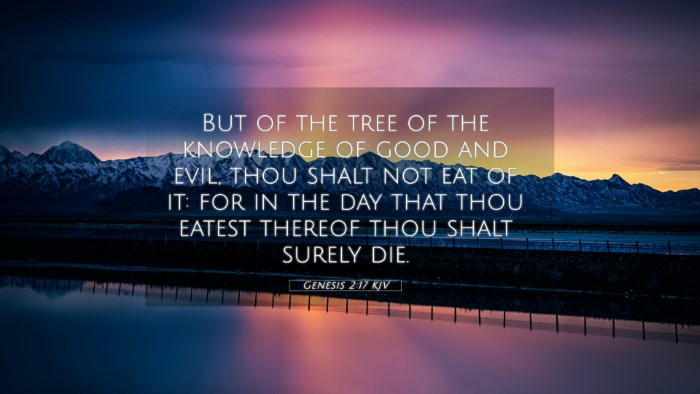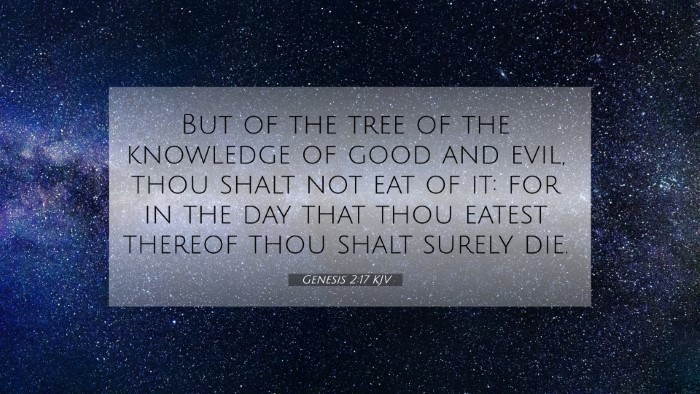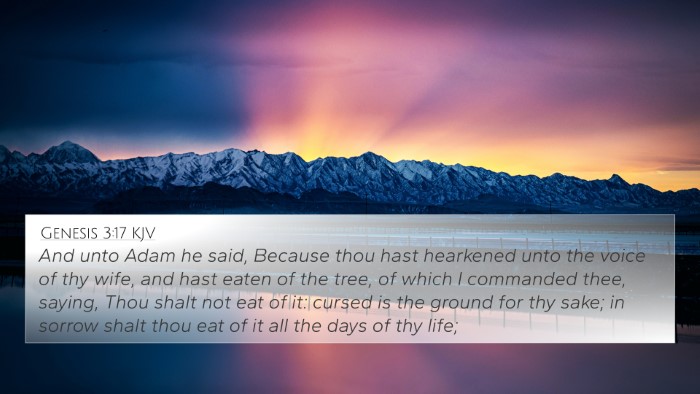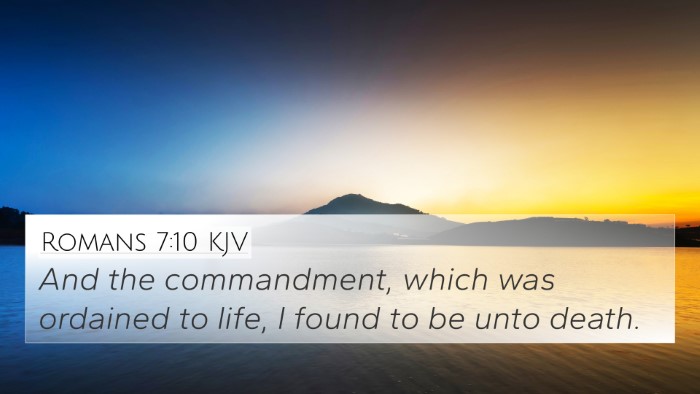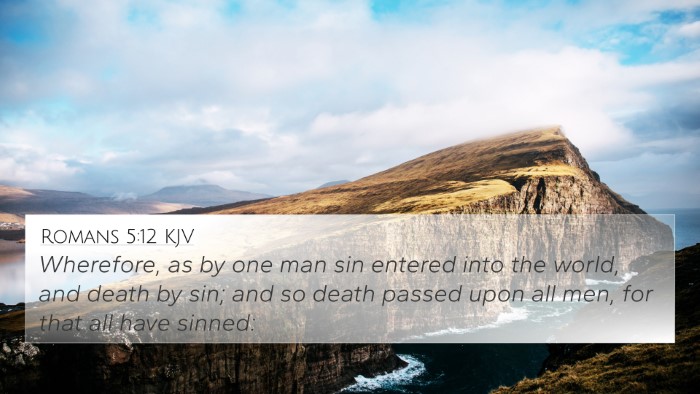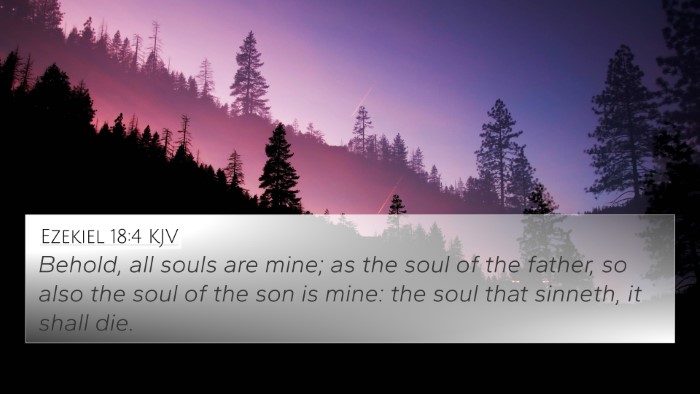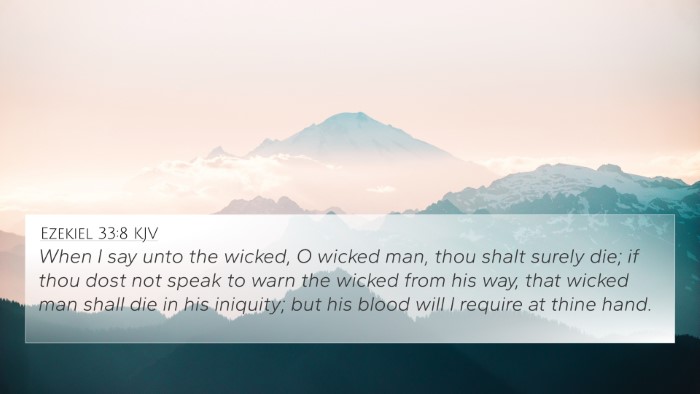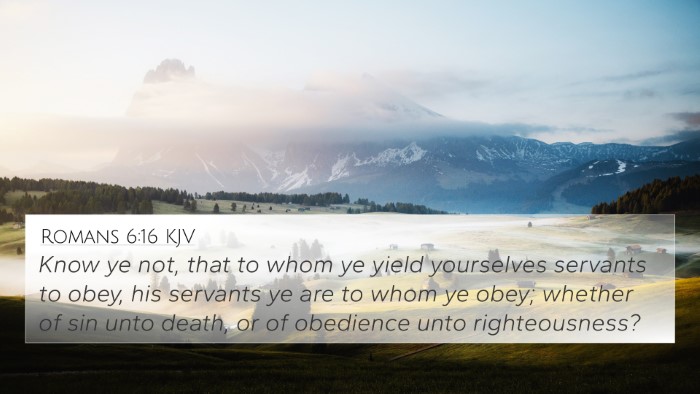Understanding Genesis 2:17
Verse: Genesis 2:17 states, "But of the tree of the knowledge of good and evil, thou shalt not eat of it: for in the day that thou eatest thereof thou shalt surely die."
Summary of Meaning
This verse presents a divine command given to Adam regarding the prohibition of eating from the tree of the knowledge of good and evil. The phrase "thou shalt surely die" indicates the severe consequences of disobedience to God's command.
Insights from Public Domain Commentaries
Matthew Henry's Commentary
Matthew Henry emphasizes the grave warning attached to the disobedience of God’s command. He explains that the tree symbolizes the boundary set by God for humanity. Eating from the tree represents turning away from God's will, leading to spiritual death and a state of separation from God.
Albert Barnes' Notes
Albert Barnes expands on the idea of the tree as a test of obedience. He notes that the prohibition demonstrates the importance of free will in human choice. The warning signifies the seriousness of sin and its repercussions, asserting that mankind's failure to adhere to God's instruction leads to death, both spiritually and potentially physically.
Adam Clarke's Commentary
Adam Clarke discusses the concept of knowledge that the tree represents. He highlights that this knowledge is not merely about intellectual understanding but pertains to moral knowledge—understanding good and evil. Clarke warns that humanity’s attempt to grasp this knowledge independently results in dire consequences and a fall from grace.
Cross References and Their Relevance
- Romans 5:12: "Wherefore, as by one man sin entered into the world, and death by sin; and so death passed upon all men, for that all have sinned." This passage highlights the theological implications of Adam’s disobedience as a universal act affecting humanity.
- Genesis 3:6: "And when the woman saw that the tree was good for food, and that it was pleasant to the eyes, and a tree to be desired to make one wise, she took of the fruit thereof, and did eat." This verse portrays the moment of temptation and the act of disobedience that Genesis 2:17 warns against.
- Ezekiel 18:4: "Behold, all souls are mine; as the soul of the father, so also the soul of the son is mine: the soul that sinneth, it shall die." This emphasizes personal responsibility and the consequences of sin.
- Galatians 6:7-8: "Be not deceived; God is not mocked: for whatsoever a man soweth, that shall he also reap." This reiterates the principle that disobedience brings forth death, linking to Genesis 2:17's warning.
- James 1:15: "Then when lust hath conceived, it bringeth forth sin: and sin, when it is finished, bringeth forth death." This underscores the process of temptation leading to sin and death, akin to the warning in Genesis.
- 1 Timothy 6:21: "Which some professing have erred concerning the faith. Grace be with thee. Amen." Adam and Eve's error signifies a departure from faith and obedience to God.
- Revelation 21:8: "But the fearful, and unbelieving, and the abominable, and murderers, and whoremongers, and sorcerers, and idolaters, and all liars, shall have their part in the lake which burneth with fire and brimstone: which is the second death." This speaks of the ultimate consequence of sin, paralleling the "surely die" warning in Genesis.
Thematic Connections in Scripture
The verse Genesis 2:17 serves as a pivotal point in biblical theology. It relates to themes of obedience, free will, and the consequences of sin. Understanding this verse invites an exploration of how other scriptures reflect and expound upon these themes.
Tools for Bible Cross-Referencing
To delve deeper into these connections, one can utilize various Bible reference resources, including:
- Bible concordance
- Bible cross-reference guide
- Cross-reference Bible study materials
- Comprehensive Bible cross-reference tools
How to Use Bible Cross-References
When studying Genesis 2:17, utilize these tools to find related verses, identifying not only direct consequences but also the broader narrative of sin and redemption throughout the Bible.
Conclusion
Genesis 2:17 is foundational for understanding human disobedience and its ramifications in a biblical context. By linking this verse with others through a systematic approach to cross-referencing Biblical texts, one gains a profound insight into the unfolding of God’s plan for humanity regarding sin, knowledge, and the hope of redemption.

